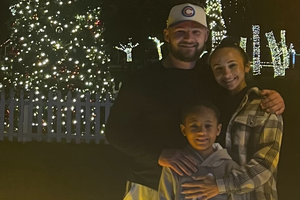Supreme Court and Religious Liberty: Catholic Foster-Care Case Looms
Sharonell Fulton, et al. v. City of Philadelphia could have major implications as the high court continues to sort out questions of how far religious-freedom protections go

WASHINGTON — The Supreme Court could take up a significant religious-freedom question next term that examines whether a city or state can require religious adoption services to place children with same-sex couples despite their faith-based objections.
The case, Sharonell Fulton, et al. v. City of Philadelphia, could have major implications as the high court continues to sort out questions of how far religious-freedom protections extend in the aftermath of its 2015 decision legalizing same-sex “marriage” in Obergefell v. Hodges.
The city of Philadelphia refused to permit foster children to be placed with families that worked with Catholic Social Services (CSS) of the Philadelphia Archdiocese in March 2018, after the organization confirmed to the Philadelphia Inquirer that in upholding Catholic moral teaching on the nature of marriage, it would not place a child with a same-sex couple and instead would refer them to another agency.
Becket law group is representing CSS, and after the U.S. Court of Appeals for the Third Circuit ruled against CSS in April, the group asked the Supreme Court in July to review the case. Becket’s brief pointed out that the case provides a good opportunity to clarify how far the religious freedom enjoyed by faith-based foster-care agencies goes, and it also affords a chance to revisit precedent set in the 1990 Supreme Court case Employment Division v. Smith, which has been applied by the lower court to limit the free exercise of religion.
Target: Religion
The Becket brief also outlines actions that the city of Philadelphia took that appeared to directly target CSS due to its religious beliefs.
Following the Inquirer’s article on CSS, and despite not having received a single complaint from a same-sex couple, Philadelphia Department of Human Services Commissioner Cynthia Figueroa “investigated whether religious agencies certified same-sex couples,” Becket attorneys noted. “She did not investigate secular agencies, and later acknowledged that she had not informed secular agencies of any policy against such referrals.”
“The commissioner summoned CSS for a meeting,” the brief continued. “There, she told CSS that it should follow ‘the teachings of Pope Francis’ (which some have interpreted to have supported same-sex couples) and told CSS ‘times have changed,’ ‘attitudes have changed,’ and it is ‘not 100 years ago.’” It was shortly after that meeting that Philadelphia cut off referrals to CSS.
“Philadelphia’s actions here were baseless, discriminatory and entirely unnecessary,” the Becket attorneys argued. “CSS has been successfully providing foster-care services to Philadelphia children for far longer than the city, and this religious ministry has never prevented a single LGBT couple from fostering. Yet the city is trying to exclude CSS from foster care because CSS refuses to embrace the city’s beliefs about marriage.”
“Free-speech rights are also imperiled by the decision below, which allows governments to exclude religious foster and adoption agencies unless they speak the government’s preferred message regarding marriage,” they emphasized.
The Smith Decision
The brief also criticized the way the Third Circuit Court applied the Supreme Court’s 1990 Smith decision in Fulton. Nick Reaves, legal counsel with Becket, explained to the Register why Smith serves as a backdrop for this case and why they believe it is time for the Supreme Court to revisit that decision.
In Smith, the Supreme Court decided that two Native Americans who were dismissed from their jobs for smoking peyote as part of a religious ceremony were not exempted from Oregon state law banning the use of peyote, a hallucinogen. In that case, Reaves explained, the court said that if the government passes a law that “is neutral and generally applicable — and what that means is, as ‘neutral,’ it doesn’t favor religion or disfavor religion on its face; and, as ‘generally applicable,’ that means it applies to everybody — if you pass this general law, Smith says that’s okay; that [law] doesn’t violate anyone’s rights.”
“Smith basically removes the religious-accommodation aspect from the First Amendment; it says ‘as long as the law applies to everybody and you’re not specifically targeting anybody, that’s fine,’” he said.
In its decision on Fulton, Reaves said, the Third Circuit Court “specifically relied on Smith and said in Philadelphia the city is treating every religious organization the same. They’re not telling the Catholic group that they can do one thing and telling the Mormon group or the Jewish group they can do a different thing, so because the law applies equally no matter what your faith, they don’t think that’s a violation of Smith; they think the law is ‘neutral and generally applicable.’”
Reaves pointed out that other courts apply Smith differently by allowing different ways of showing that a law is not neutral and generally applicable. “Other circuits have said you can show that someone else who is still similarly situated to you gets an exception for a different reason,” he said.
One example in Becket’s petition is the Sixth Circuit Court siding with counseling student Julea Ward in Ward v. Polite, where she was expelled from Eastern Michigan University for asking to refer a same-sex couple elsewhere for counseling due to her religious beliefs. In that case, the court pointed out that the school allowed referrals for “mundane” secular reasons like the client not being able to pay.
In the Fulton case, Reaves said, an example of this could be the fact that the city has laws against age discrimination but still allows foster agencies to “consider things like the age of a foster parent; if you’re 65 years old, unfortunately, in a lot of cases, an agency won’t work with you because you’re too old to be a foster parent.”
Due to the narrow way the Third Circuit interprets Smith, the Becket brief called on the Supreme Court to “reconsider Smith and restore free exercise to a more administrable rule that adequately protects a fundamental First Amendment right.”
Reaves pointed out that Justice Samuel Alito noted in his January opinion in Kennedy v. Bremerton School District that in Smith “the court drastically cut back on the protection provided by the Free Exercise” Clause.
He concluded that the implications of the court’s decision if they take up Fulton are significant both for the future of religious liberty and for faith-based foster care and adoption generally.
Forced to Close
“Studies have shown about 45% of Catholic Charities’ adoptions were of children with special needs; and across the country, and especially in our Michigan case on foster care and adoption there, with St. Vincent, religious agencies are able to recruit families and parents who might not otherwise choose to adopt or foster,” Reaves said, “and they’re able to place sibling groups, older children and minority children better than any other organization; so when you remove some of these really critical agencies from the system, that means it’s really hurting those kids who are most in need.”
Many Catholic adoption providers have been forced to close due to a lack of religious exemptions. Catholic adoption services have closed down in Boston, San Francisco, Washington, D.C., and Illinois due to state requirements that dictate providers place children with same-sex couples. Catholic Charities of Buffalo, New York, ended its adoption services in August 2018. The state of Michigan reached a settlement in April with the American Civil Liberties Union (ACLU) mandating that all adoption agencies work with same-sex couples. Becket filed a lawsuit in response on behalf of St. Vincent Catholic Charities.
Larger Implications
Andrea Picciotti-Bayer, a legal adviser for The Catholic Association, told the Register that the Philadelphia case could be “huge” for religious liberty because it is looking at “any kind of partnership where faith-based agencies are being asked to certify same-sex marriage as an okay model for families as a condition for working with local or state governments.”
Picciotti-Bayer explained how religious groups are being targeted by laws that have sprung up in recent years and were not envisioned by the Supreme Court in the Smith decision. “The Smith case in particular, just didn’t envision — because it wasn’t before the court, and it wasn’t an issue before the country — how imposing these … SOGI [sexual orientation and gender identity] laws are and how they can generally be presented as a neutral law. But they’re not really neutral. They’re really going after people of faith and institutions of faith and trying to basically condition people’s thinking, impose ideas on churches and people of faith, especially Catholics.”
She said that, in defending CSS, Becket is pointing out that “some of the lower courts have gotten it wrong, and so the only one who’s going to clarify things and really be consistent with the First Amendment demands is the Supreme Court; and at this point, the circuit split is so significant in understanding the precedent that it’s time to clarify it. You can’t let this cook any longer.”
Picciotti-Bayer praised the perseverance of CSS and Philadelphia Archbishop Charles Chaput in continuing the legal battle amid the closures of agencies in other states.
“When you think about these agencies, in the case of Philadelphia, Catholic Social Services isn’t a money-making operation and their foster-care program was always running at a loss economically, but it’s part of the Church’s ministry and mission to reach out to the most vulnerable,” she said. “It really reflects the leadership of Archbishop Chaput and the head of Catholic Social Services and Becket to say, ‘This issue is so important that we’re not going to give up without a fight.’”
She added that a lot is at stake in CSS’ petition because if the Supreme Court doesn’t take it up, CSS will be unable to sustain their program as “kids age out or they’re placed into permanent homes,” because “if they’re not receiving any new kids, you can’t keep an office open. This is the time for the court.”
“There has already been a significant number of justices on the court recognizing the significance of the case,” she noted, pointing to three Supreme Court justices — Neil Gorsuch, Clarence Thomas and Samuel Alito (Justice Brett Kavanagh had not yet joined the court) — who said they would have granted an emergency stay in the case last August despite such motions being extremely atypical for the court to grant.
Support From Texas
The Catholic Association was among the groups that filed friend-of-the-court briefs in support of CSS in the Third Circuit Court of Appeals. The state of Texas also filed a brief supporting CSS in the Third Circuit, and Texas Solicitor General Kyle Hawkins told the Register why the case was significant to the Lone Star State.
“This is a case about defending religious freedom. Catholic Social Services was helping the people of Philadelphia find loving homes for neglected children, but the city of Philadelphia ousted CSS simply because of its religious beliefs on the nature of marriage,” Hawkins said. “Texas is fighting to defend religious freedom and the principle that the government cannot punish a faith-based organization because the government doesn’t like its religious beliefs.”
For Hawkins, the CSS case challenges some prevailing attitudes toward religious liberty — and also demonstrates that such services as CSS and similar religious organizations provide a compelling interest to the public at large.
“Catholic Social Services has a strong track record of helping needy children find safe, loving homes,” Hawkins said. “Philadelphia should embrace that success and stand for religious freedom, rather than shun CSS for its views on marriage.”
He said, “Philadelphia should not be permitted to require Catholic Social Services to abandon its religious beliefs in order to participate in the local foster-care program.”
Register staff writer Lauretta Brown is based in Washington.

















